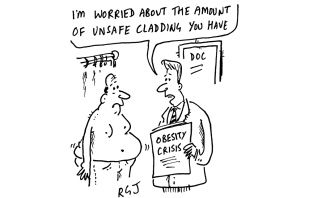I first came across the Zoe programme when a bright yellow package arrived on my parents’ doorstep last year. My mother, like many, had been wooed by the TV personality Davina McCall into ‘living her best life’ by ordering a Zoe gut-health testing kit (at an upfront cost of £299, or £599 for the Plus plan).
Zoe is the invention of Tim Spector, the professor-turned-health guru who ran the Covid symptom-tracker app throughout the pandemic. It’s a personalised nutrition programme that promises to make you ‘feel’ healthier and improve your gut health, energy levels and even flatulence.
With their branded glucose monitors, my mother and her friends have become walking adverts for Zoe
It works by giving you what most know as a diabetes continuous glucose monitor (CGM) that measures your blood sugar levels after eating. Once you’ve spiked the device into the back of your arm, you eat a ‘test’ cookie, prick your finger, pop a poo sample in the post, and voilà, a full metabolic analysis is on its way to you. Zoe then scores the make-up of your meals from 0-100, helping you ‘make choices guided by personalised science’. ‘Discover how your body responds to different foods,’ Spector says. There’s nothing like a sultry, silver-haired scientist telling you your body is special.
Not long after that yellow box arrived, my mother and her friends became walking adverts for Zoe, their branded CGMs proudly stuck to their arms like pin badges for protestors. Since the company’s launch, 250,000 have signed up to join them, all, presumably, paying the £35 monthly subscription fee. The conversation around my mother’s kitchen table has changed from who’s had Ozempic or who’s divorcing who to their own digestive systems. ‘Did your report tell you to stop eating oats?’; ‘Almonds and I get on so well!’; ‘Red meat is an absolute no-go.’ To my Gen-Z ears, this restrictive approach to food is an eating disorder waiting to happen.
My mother and her friends’ test results told them that they process fat badly, their diets are poor (all that Ortiz tuna!) and their gut microbiomes are well and truly lacking. As the ‘worried well’ panic set in, my family’s fridge was emptied of refined carbs and animal fats, gradually replaced with kefir and pulses. Getting a huge data dump of personalised results and a deluge of very general recommendations is enough to send any already health-conscious person into a manic fridge-clearing episode. I’m no expert on her gut microbiome, but I can also tell you that my mother’s anxiety over what she eats has definitely escalated. And this, I think, is the trouble with our new obsession with tracking our own health.
Now, I’m not coming for Zoe in particular. It’s the whole booming industry of health-tracker apps and gadgets. Whether it’s an Oura ring, a Whoop band or the newest Apple watch with ECG capabilities, the middle classes have a growing appetite for ‘wellness’ tech. The global wearable technology market was valued at $61.3 billion in 2022, and it is steadily increasing. But could it be that a culture of over-monitoring everything that occurs in and out of our bodies has as many downsides as it has upsides?
This isn’t just my personal worry. Studies have begun to prove that there is a downside to constant health monitoring. Cardiovascular professors have concluded that the use of technology to self-identify atrial fibrillation, a common heart rhythm problem, has caused considerable distress in healthy people who receive irregular pulse notifications, which can then cause their heart rate to rise. Another study shows that, overall, self-measurements can be more problematic than beneficial, because patients begin to use information from their Fitbits as they would if the information was from a doctor.
The University of Copenhagen researchers also pointed out that because these technologies heighten awareness of normal fluctuations, they may prompt people to seek unnecessary medical care. I spoke to a GP this year who told me that patients were coming into the surgery with Excel spreadsheets, concerned about data they were seeing from their devices. In her view, rather than saving her and her colleagues time, all the health technology is more often than not applying extra pressure on them.
The evidence that continuous glucose monitors can help non-diabetics is also, frankly, weak. Zoe’s heavily referenced Method trial – one that was only published in a peer-reviewed journal in May – is not impressive. The trial measured the whole of the Zoe programme, including all the testing, support, monitoring and education, against a generic dietary advice leaflet, video and a few emails. OK, so it proved that the entire Zoe programme has more effect than a PDF from the US government. Big surprise.

It is also not clear if it was blinded effectively. Only the Zoe testing group was asked to record in real-time everything they ate on at least four consecutive days per month on the app. I don’t know about you, reader, but if a healthcare professional tells me to track everything I eat, I’d think twice about that extra helping of pud. To add to this performance bias, the fact that the Zoe testing group had to wear a CGM at all times served as a constant spiky reminder of their bodies being analysed. Another biscuit? No thanks.
In fact, what kills people in the UK is LDL cholesterol and high blood pressure – two things that no wellness technology can measure. My father was lucky enough to catch his heart disease early by getting checked out at the GP. His Apple watch and Whoop band didn’t register the slightest cause for concern.
Neatly tucked away in the disclaimers of my mother’s insights report after completing her testing, the Zoe app stated: ‘Before making any changes to your diet, please consult a physician.’ But surely the point of the programme is to ensure that a customer doesn’t need to see a GP? To my mind, all Zoe and the other wellness gadgets and plans really tell you is what we were told by our parents or at school: eat more fresh fruit and veg. Do more exercise. Get more sleep. You don’t need to spend hundreds of pounds or download an app to know that.







Comments